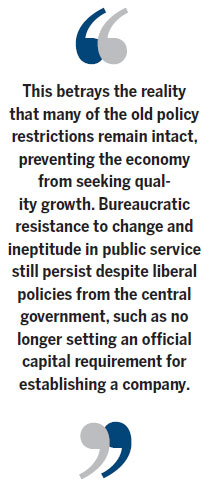Boom of new firms is not what it seems
Updated: 2014-07-11 07:25
By Ed Zhang (China Daily Europe)
|
|||||||||||
Abolishing old capital requirements only part of badly needed change
Of China's half-year economic reports, one is less noticed, the one about the number of newly registered companies, which was issued by the State Administration of Industry and Commerce on July 8.
Some 4 million new companies have sprung up since the beginning of March, when the old capital requirement system was abolished and replaced by a more liberal registration system in which a citizen can practically set up a company with only 1 yuan of capital. Their national total showed a spectacular rise of nearly 70 percent from one year ago.

Many of the new companies, up to 80 percent of the register in some places, are privately owned.
Earlier data from the State Administration of Industry and Commerce show that in March, there were 61.7 million companies in China, encompassing all ownership schemes.
In Zhejiang province, which boasts the largest cluster of privately owned companies in China, more than 95 percent of new registrations were by private owners.
In Shanghai, 75,000 new companies were set up from March to June, increasing 45 percent, and 350 percent in capital commitment year-on-year - although part of the reason for so much change is the eagerness of many domestic investors to relocate into the Shanghai free trade zone.
Some Chinese business media hailed the development as the opening of the floodgates of entrepreneurship.
Suppose the new companies make an average investment of 1,000 yuan ($161, 118 euros). A total of 4 billion yuan would be channeled to the country's development. And suppose they each create 10 jobs. There would be more than 40 million new jobs, almost six times the number of college graduates the country produces every year. There would be no more need for local governments to design various fiscal incentives for the initial employment of those young men and women.
However, things can't be so simple. From business reports from the provinces, the quality of the new companies is dubious. Most of them are small (that is, with a capital commitment of less than 5 million yuan by the government's registration standards).
They are reportedly concentrated in distribution and retail business - a category that may also cover logistics services in China.

Such companies come and go frequently. They come when government policy and the business environment are good, and they fold when the policy is no longer helpful or the market turns sour. Their large number can influence a city's GDP structure, to make it look more service oriented. But they hardly contribute to a local economy's long-term resilience and competitiveness.
Even worse, according to a news report from Tongxiang, Zhejiang province, newly registered companies are still concentrated in the traditional textile and garment industry. This could be even more dubious because it can be an easy way for the boss of a defunct garment factory to evade debt and wage owed to workers.
Only in a few cities did companies in information and technology services, however small they might be, account for a noticeable share of the new companies.
There were even fewer privately held services in education and health care, two industries that are most important for a city's sustainable economy.
This betrays the reality that many of the old policy restrictions remain intact, preventing the economy from seeking quality growth. Bureaucratic resistance to change and ineptitude in public service still persist despite liberal policies from the central government, such as no longer setting an official capital requirement for establishing a company.
Perhaps, for any reform policy to realize its best potential, it would take the revision of another 10 or 20 policies. And to revise them one by one would be a much more demanding task. Central-level officials have shown their determination to do so, but doing so (as part of the economy's transition process) will take much more time.
The author is editor-at-large of China Daily. Contact the writer at edzhang@chinadaily.com.cn
(China Daily European Weekly 07/11/2014 page13)
Today's Top News
Germany wins World Cup on Gotze's brilliance
German suspect was not in contact with spies: US
Xi makes 'symbolic' stop in Greece
Baidu big winner in World Cup
Luxury car sales accelerate
Pianist Lang is on his game in Rio
School helps HIV students
$2.9 billion in gambling assets seized
Hot Topics
Lunar probe , China growth forecasts, Emission rules get tougher, China seen through 'colored lens', International board,
Editor's Picks

|

|

|

|

|

|





